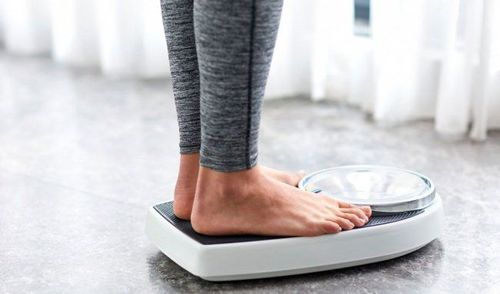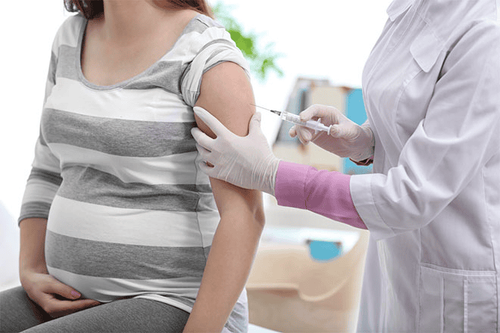This is an automatically translated article.
The article was professionally consulted by Specialist Doctor I Nguyen Thi Man - Doctor of Obstetrics and Gynecology - Department of Obstetrics and Gynecology - Vinmec Danang International General HospitalPre-pregnancy preparation lays a strong foundation for a healthy pregnancy and a healthy baby. Take the following steps to get physically ready to welcome your baby.
1. Stop smoking
Smoking makes it harder for you and your partner to get pregnant. Men who smoke have lower sperm counts and have malformed sperm.Pregnant women who smoke have a higher risk of miscarriage, premature birth or low birth weight, which can cause serious health problems. Your baby's risk of sudden infant death syndrome (SIDS) is also increased if you use tobacco.
And although e-cigarettes may be less harmful, they still contain nicotine, which prevents your baby's brain and lungs from developing in a normal and healthy direction. So stop using e-cigarettes.
2. Weight control
Being overweight or underweight both makes conceiving more difficult. The closer you are to your pre-pregnancy weight, the lower your risk of problems like diabetes and high blood pressure. It also reduces the risk of your baby being born prematurely, having a neural tube defect, or growing larger than normal inside the mother's body.You should know and understand your BMI and the ideal weight for your physical condition. Regular exercise can help you reach your goals, just as eating a diet made up mostly of vegetables, protein, lean, low-fat dairy and whole grains. Get expert advice from your doctor or dietitian for a healthy diet.

3. Vitamin Supplement
In the past, doctors often advised women to take folic acid as soon as they became pregnant, but today, experts recommend taking a vitamin containing 400 micrograms of folic acid before you have a baby. This essential nutrient prevents neural tube defects while your baby is growing.Check to see if the pre-pregnancy vitamin you are taking contains DHA. Omega-3 fatty acids support your baby's health while you're pregnant. You need 200 milligrams of DHA per day throughout your pregnancy. Some prenatal vitamins contain DHA, but not all do. Ask your doctor if you should take a separate DHA supplement!
Your doctor may suggest you take extra vitamin D, if your vitamin D levels are low, you may have problems getting pregnant the first time.
4. Check family history
Has any member of your family had a child born with birth defects, diabetes, epilepsy or developmental problems? This is the time to check and inform the doctor. This will affect the tests your doctor will order for you. If your family or partner has a history of the syndrome, a blood test can show whether you and your partner carry the gene for the disease and what the risk is for your baby.5. Stop using stimulants and alcohol

For example, men who smoke weed have low sperm counts for weeks after stopping use. Women who smoke weed have a harder time getting pregnant than those who don't.
Heavy alcohol use (eight bottles over a week or four at a time) also affects fertility. It's still not clear if the occasional beer or glass of wine affects a woman's ability to get pregnant, but experts recommend that it's safest to stop drinking altogether while you're trying to conceive. No amount of alcohol is safe for a developing baby, not to mention you may not know you're pregnant for several weeks or months.
6. Stop drinking coffee
Drinking more than 500 milligrams of caffeine (3-4 cups) a day can make it difficult for you to try to conceive. One study found that women and their partners who drank more than two cups of coffee a day in the weeks before becoming pregnant had a higher risk of miscarriage. Meanwhile, small amounts of caffeine per day may not be harmful.7. Visit with a doctor
If you are having health problems, let your doctor know when you want to start trying to get pregnant. The more information about a patient's health status, the more doctors can optimize them before pregnancy and reduce the impact on the baby.Your doctor also needs to know all the medicines and supplements you are taking, including prescription drugs and any over-the-counter medicines, if any could pose a risk to your unborn baby, Your doctor may suggest replacing with other types if needed.

8. Don't trust Dr. Google too much
It's easy to find quick answers online to any question you might be interested in, but the internet is full of myths related to pregnancy and prenatal care. The many opinions sparked by a social media storm can quickly turn myths into reality.Before memorizing what you read online, consult your doctor first for the most accurate advice.
Understanding the importance of pre-pregnancy screening, Vinmec has implemented the Pre-pregnancy Health Care and Counseling Program to help couples who are planning a pregnancy, parents who have been pregnant before. pregnant or giving birth to a child with birth defects, parents who have had events in previous pregnancies minimize the risk that may occur during pregnancy.
Please dial HOTLINE for more information or register for an appointment HERE. Download MyVinmec app to make appointments faster and to manage your bookings easily.
Reference source: Webmd.com













